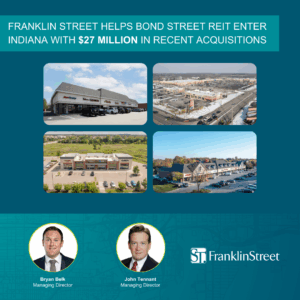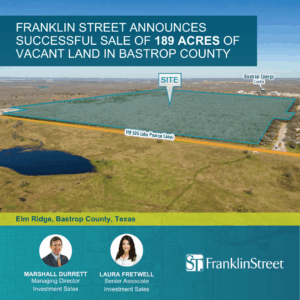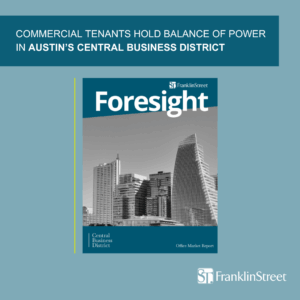TAMPA, FL—Capitalization rates are compressing in Tampa. But what’s causing it? How have interest rates affected the trend? And where do we go from here? GlobeSt.com caught up with Jonathan Graber, a retail investment associate with Franklin Street’s Tampa office, to get his take on these questions.
GlobeSt.com: What is happening to the cap rates in Tampa?
Graber: Capitalization rates are at all-time lows. We have seen them compress anywhere from 25 to 50 basis points on single tenant net lease assets since the beginning of 2014 with some tenants seeing a larger compression. While it is much harder to define cap rates on anchored and unanchored shopping centers, because there are so many variables that come into play, they are still significantly lower than they were in 2012 with some eclipsing levels we saw during the bubble years.
GlobeSt.com: What is causing this compression?
Graber: Lack of supply, lack of new construction and historically low interest rates.
GlobeSt.com: How has lack of supply affected the capitalization rates for NNN properties?
Graber: In Florida, retail tenants are not expanding as rapidly or they are in consolidation mode. Banks, drugs stores, sit-down restaurants, and auto service providers are all experiencing little to negative growth. There are some bright spots, though, including convenience stores, dollar stores, auto part suppliers, and some fast food concepts, like Dunkin’ Donuts, aggressively pursuing and opening new locations.
GlobeSt.com: How have interest rates affected the trend?
Graber: We are still at historically low interest rates, which has dramatically helped real estate. Buyers are able to finance purchases with terms we have never seen before. Other investment vehicles are providing low returns, and real estate, while still low, can provide higher returns and a tangible asset. In one example, I recently quoted a 10-year loan with a credit-worthy tenant at a fixed interest rate of 3.8%. Individuals are able to generate positive leverage even at historically low cap rates.
GlobeSt.com: What is the outlook for the short term?
Graber: I don’t foresee a change in capitalization rates on retail property in the short term, due to the factors previously mentioned: lack of supply, lack of new construction, historically low interest rates and increased demand. We are at the mercy of the federal government and the marketplace, but most experts don’t think interest rates will spike any time soon. If there was ever an ideal time to consider selling your retail property, I would be hard pressed to find a better time in the past seven years than today.



